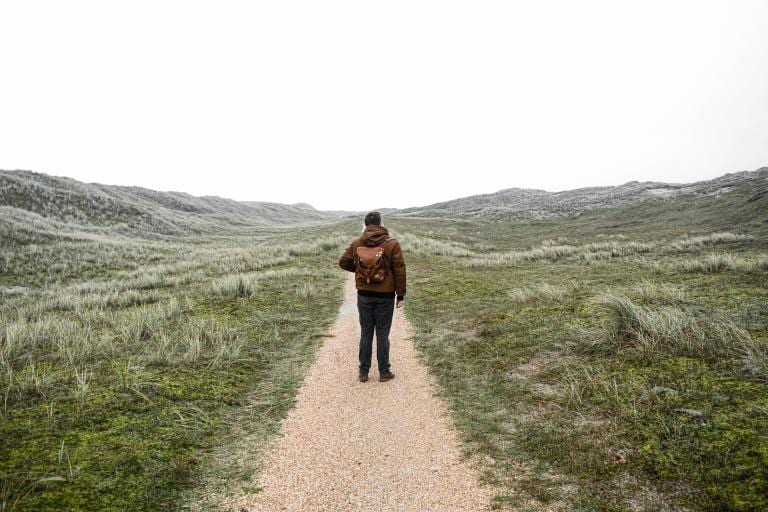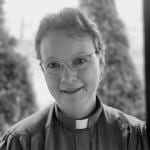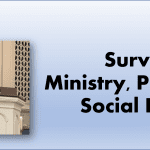How can we be church in the midst of a wilderness of conspiracy theories? Like John the Baptist, we point to what is true, trustworthy, and trust-producing.

Text: John 1:6-8, 19-28
I had a conversation with a friend a few weeks ago who announced to me their decision to no longer believe science.
This person prefaced their announcement by reminding me that they had decided to reject Christianity many years ago and practice “critical thinking” instead. Now, my friend explained, they have decided to reject what scientists and public health experts are saying about Covid-19. This friend has discovered a website that pumps out so-called “journalism” that my friend believes is “the truth.” This means that my friend now questions the pandemic death counts and doubts the “mainstream media doctors” because she is exercising her “critical thinking.” My friend even suspects that the coronavirus itself may not be real.
I was flabbergasted and tried to reason with my friend. But they wouldn’t budge.
“This is my truth,” my friend declared.
As you might guess, I was distressed and angry at the end of this conversation. Because my friend’s “truth” could lead them to make decisions that end up killing people. They don’t want to wear a mask. They won’t get the vaccine when it’s available. They’ll only believe what a particular charismatic internet personality tells them.
With a little digging about the source of my friend’s information, I learned that it’s based on debunked anti-vaccination conspiracy theories. A man with a website and platform for his propaganda is spewing them on his fabricated internet talk show. I’ve also learned that QAnon has made inroads into the wellness community, which my friend has been part of for decades. According to this article in Cosmopolitan, the millennial wellness community has increasingly embraced, radical, nonsensical, easily debunked QAnon conspiracy theories. This cult is seducing millions of people like my friend. My college-educated, post-Christian, anti-science, conspiracy-believing friend.
Here in this wilderness of conspiracy theories, misinformation, and propaganda, a voice cries out to us.
‘Make straight the way of the Lord!’ (John 1:23)
What does this mean? Why should we believe John the Baptist when there are so many others who claim to have “the truth”? Who is he anyway? Isn’t he just another guy with a platform? Why should we believe him?
The priests and Levites were sent to John to ask these very questions. We may think that they were merely charged with a reconnaissance mission to suss out the truth about this strange character baptizing people at the river. But there’s more going on here.
Their questioning was meant to undermine John’s authority and his message. Even more, they wanted to sow seeds of doubt about the truth he was proclaiming, the truth about Jesus.
There was probably a crowd at the river listening to this exchange between John and the priests. They were caught in the drama between these two sources of authority. Who will they believe? Who will they trust? Who’s telling the truth? Who will they follow?
Just like that crowd at the riverside, we, too, are trying to figure out what is true, who to trust, who to believe.
You might wonder, what is God’s role in all of this? The Gospel is very clear that God sends John to testify to the light. God’s intention and action is explicit.
People are to believe John’s testimony because it is true, it’s trustworthy, and it is trust-producing.

It’s the straight path. It’s not some winding, erratic, illogical conspiracy obstacle course that forces you to engage in mental acrobatics to figure out what’s true. The prophet’s path is straightforward. It’s true, it’s trustworthy, and it is trust-producing.
It follows, then, that John’s testimony is intended to prepare the way for Jesus who is himself true, trustworthy, and trust-producing.
But that doesn’t mean that the path is going to be easy.
The crowd at the river, and we today, need to come to terms with the fact that following Jesus means going to the wilderness places. It means squaring off against those who are pulling people in different directions precisely to create confusion.
Discerning what is the straight path is especially critical in our current wilderness where voices are trying to undermine our faith.
They’re trying to get us to question reality. They want to lead us into dark fantasies of conspiracy and intrigue. Just think of all the ways this is happening today.
There are strident political divides with white supremacists disputing and denying the election results. Their efforts have undermined trust in democracy and weakened our faith in long-standing social institutions. And this has led to an attempted coup in Washington D.C. with more QAnon-fueled violence almost certain to follow.
We’re plagued with Covid-19 issues that pit anti-maskers and people like my friend against science and public health.
The decades of manufactured denial about human-caused climate change and environmental pollution has resulted in a world on the brink of ecological collapse.
All of this societal psychosis began decades ago as corporate schemes to plant tiny viruses of doubt in order to protect power and profits. But with the rise of social media, those tiny viruses have exploded into a pandemic of propaganda. They are attacking truth, science, and reality itself.
Lies, half-truths, and manipulative spin are spun out of so-called news organizations like Fox, NewsMax, Breitbart, and OANN. Bloated media personalities, including the one in the Oval Office, bullhorn their hate-filled falsehoods to millions of followers. Social media networks on Facebook, Twitter, and now Parler profit from the propagation of propaganda. Not to mention the shadowy QAnon cult that draws in millions of followers with its siren song of conspiracy theories.
So, how can we be church in the midst of this wilderness? In the midst of this bizarro, upside-down world where fact is made fiction and lies become truth?

Just like that crowd at the river, we’re going to have to make choices.
Are we going to follow those who deliberately undermine truth? Or will we follow John and the values he exemplified by testifying to that truth? [See this excellent sermon by my colleague, Rev. Stephen M. Fearing: Truth or Trump: Christians Must Decide.]
John defiantly refused to participate with a system that traffics in half-truths, lies, gaslighting, conspiracy, and manipulation. His ministry was about prophetic truth-telling. “Make straight the path of the Lord!” None of this curvy, conspiracy theory, connect-the-crazy-dots kind of path.
We must maintain our commitment to the faithful witness of John and the light that is Jesus Christ. Because Jesus himself is true, trustworthy, and trust-producing.
This means we have to come to terms with the fact that the straight path runs right through the wilderness.
Our focus MUST be on creating and following the straight path. We must join John in testifying to the light of Jesus. In turn, WE have to be true, trustworthy, and trust-producing.
What are ways that we as the church can create that path of truth and teach our members how to recognize what is true, trustworthy, and trust-producing?
How might the church create this straight path in the wilderness?
Well, it’s time to get back to the basics. The church needs to help people learn how to distinguish what is true from what is not. We’re going to have to brush off that essential Commandment: “You shall not bear false witness.” This is a direct command from God not to lie or spread falsehoods.
We’re going to have to confront the brutal dishonesty of our communications industry. And hold people accountable for the consequences of their lies.
We’re going to have to tell the truth about the systems of race, wealth, and privilege that benefit from lies, gaslighting, and manipulation through fear.
The church is going to have to engage in the difficult but necessary conversations about what it means to live in a twisted moral paradigm that rewards and profits from lying, disinformation, and undermining truth.
We’re going to have to have real talk about what this toxic environment of deceitfulness means for our society, for our families and communities, and for the church. And we have to be clear that lying is not the will of God. Because God desires only what is true, trustworthy, and trust-producing.
So we’ll have to do some education. We can hold forums for teens and adults about QAnon, Parler, and OANN. We can offer classes for how to figure out what is “true” and real on the internet. There are educators in our congregation who can help us! They can give us a basic course or a refresher on the scientific method, how it works, and why it’s necessary for a functioning society.
Above all, we need to preach and teach the gospel of Jesus Christ, the one who was true, trustworthy, and trust-producing.
We need to model honesty, basic decency, and compassion. In the midst of a wilderness of dishonesty, corruption and abuse, we need to care for the vulnerable, honor our neighbors, and protect the weak.
Ultimately, this gospel proclaims that there is a power that is greater than a destructive ego (like the ones who questioned John, like the corporate heads, and like the blowhards with bullhorns). And it’s longer-lasting than lies.
It is the power of truth, honesty, and discernment. It’s the power of advocating for and protecting the vulnerable. And it’s the power of casting a vision for the Realm of God.
This is the truth to which John testified. This is what Jesus’ ministry, life, death, and resurrection were about. And this is who God is, what God does, and what God wants to church to be about.
Make straight the way of the Lord, the straight path of truth. Listen to John. Follow Jesus.
Read also:
Trumpism is a Starfish, not a Spider. How should churches respond?
Pastoring During (and After) the Coup: Staying Alert, Telling the Truth
Truth or Trump: Christians Must Decide (Guest Sermon)
Gaslighting in the Age of Trump: 6 Tips for Survival

Leah D. Schade is the Assistant Professor of Preaching and Worship at Lexington Theological Seminary in Kentucky and ordained in the ELCA. Dr. Schade does not speak for LTS or the ELCA; her opinions are her own. She is the author of Preaching in the Purple Zone: Ministry in the Red-Blue Divide (Rowman & Littlefield, 2019) and Creation-Crisis Preaching: Ecology, Theology, and the Pulpit (Chalice Press, 2015). She is the co-editor of Rooted and Rising: Voices of Courage in a Time of Climate Crisis (Rowman & Littlefield, 2019). Her latest book, co-written with Jerry Sumney is Apocalypse When?: A Guide to Interpreting and Preaching Apocalyptic Texts (Wipf & Stock, 2020).
Leah is also co-founder of the Clergy Emergency League, a grassroots network of clergy that provides support, accountability, resources, and networking for clergy to prophetically minister in their congregations and the public square in this time of political upheaval, social unrest, and partisan division.
Twitter: @LeahSchade
Facebook: https://www.facebook.com/LeahDSchade/













